The band telling the history of Glasgow by song
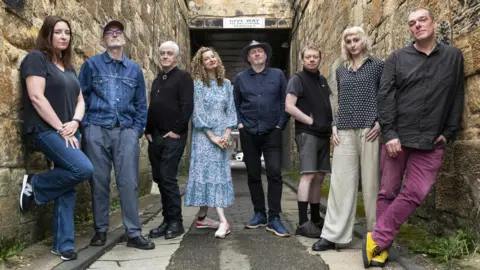 Julia Bauer
Julia BauerFrom suffragettes to fighters in the Spanish Civil War, they are the people and stories woven into Glasgow's history.
A new project is bringing fresh life to the city's past - through a rock band.
The Tenementals are a group of academics and musicians who aim to use their songs to tell the "radical history" of Glasgow.
Now the nine-strong collective have released their debut album Glasgow: A History (Vol. I of VI), with the intention of another five volumes to come.
For singer David Archibald, who is by day professor of political cinemas at the University of Glasgow, the band offers a chance to tell history while also getting people onto the dancefloor.
"We create these songs that are political and philosophical but we want people to dance at the same time and have fun," he explains.
"We want people to dance to radical history. We don’t see a barrier between having a good time and thinking about the world at the same time."
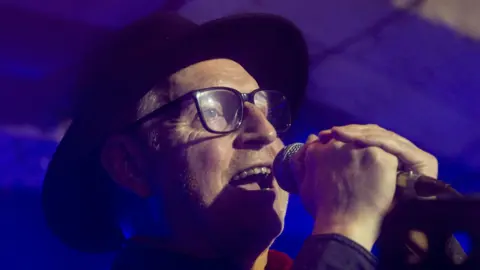 Julia Bauer
Julia BauerThe band's own history owes a debt to the likes of Marc Bolan and David Bowie.
David was previously involved with the Glasgow Glam Rock Dialogues, an onstage debate in which he and others would dig out the glitter and discuss serious world issues while dressed up as glam rock stars.
The unusual idea proved popular, and after several performances - and guest appearances from the likes of Franz Ferdinand's Alex Kapranos and Bob Hardy - David decided to fuse his passions of music and history in another way.
"We decided to explore what if a rock band tried to tell the history of a city – what would it sound like?
"My feet are at the heart of the songs, or at least my body is. A lot of them come from walking around the city and just encountering things.
"We have one foot in higher education, and one foot in Glasgow’s vibrant music scene. It's the rock band that drives it though - the music determines where the band has got to go."
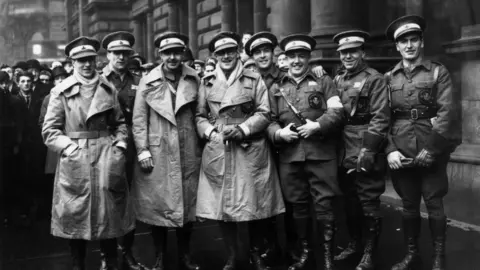 Getty Images
Getty ImagesWhere the group go is all across the city, for both good and bad.
David points out he never wanted the group to fall into becoming a twee "I belong to Glasgow" type of act, so their songs try and reflect all aspects of the Dear Green Place.
For example, A Passion Flower’s Lament deals with the Scots who went to the Spanish Civil War in the 1930s.
"One of them was a young Glasgow University chemistry student who fought in Spain and was killed in quite murky circumstances," explains David.
"Civil wars are dirty, difficult things and it talks about the complexity of that, but also asks if we should we even worry about that when fascists are coming back."
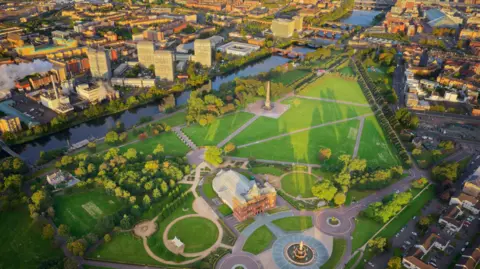 Getty Images
Getty ImagesOther songs touch upon people executed or deported for their part in the Radical Wars uprising in 1820 while The Owl of Minerva imagines an airborne trip across the whole city, through the eyes of an owl taking flight from Finnieston Crane.
"There are things that have scarred this city and affected it negatively, there are positive things, there are things that are both at the same time.
"We want to understand the complexities of this city and grapple with it."
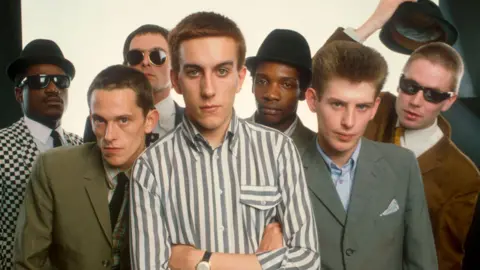
The formula has brought them success both at home and abroad.
Earlier in 2024 they supported Belle & Sebastian at the veteran indie-pop band's homecoming shows in the city, while their version of German protest song ‘Die Moorsoldaten/Peat Bog Soldiers’ was placed in the archives of a concentration camp where it was known to have been sung.
Actress Maxine Peake also asked the group to perform at the the Working Class Movement Library in Salford.
"I think there’s a massive thirst for people who have ideas about things," says David.
"You don’t have to agree with what we’re saying in order to engage with it.
"If the songs weren’t good then the project would fall on its rear end, but there’s an interest there.
"When I was a kid I was politicalised by music like the Jam and the Clash and the Specials.
"When the Specials were on Top of the Pops we’d be at rallies yelling 'black and white unite' to fight against fascism.
"There is scope for more political acts – you’re seeing that now in Ireland with bands like Kneecap."
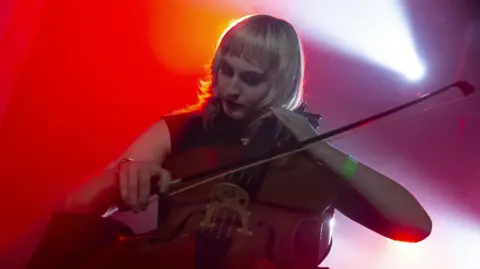 Julia Bauer
Julia BauerHaving just launched their first album with a gig at Glasgow's Oran Mor venue in November, they are already targeting work on a follow-up in 2025.
However although the group are interested in the past, David is less concerned with nostalgia and more fascinated by the future.
"We’re interested in radicals, because they change history – they look at things and say 'no'. That maybe there is a different way of doing things.
"Whether that’s suffragettes, the Spanish Civil War, the workers who occupied the shipyards in 1971 – we’re interested in those moments because they need to be looked after and nurtured.
"But we also want to be taking these moments and blasting them into the future.
"We’re concerned with radical futures rather than radical pasts."
